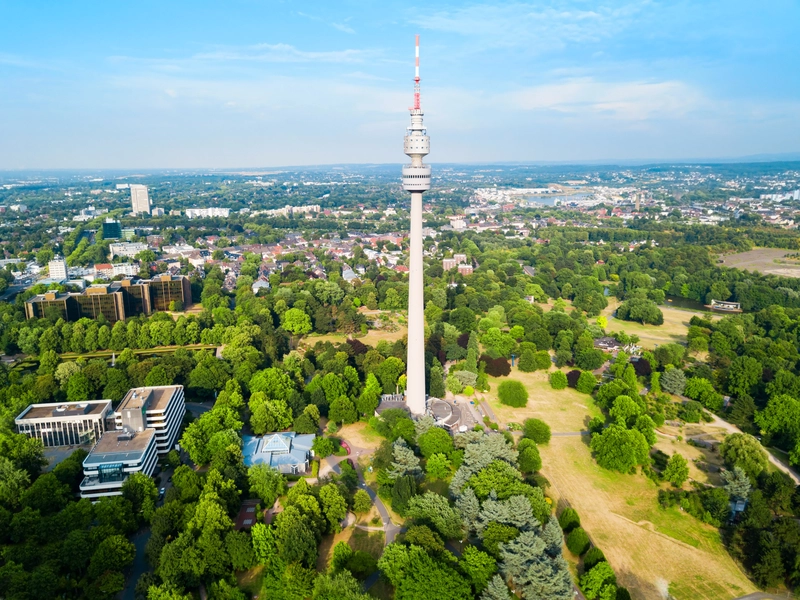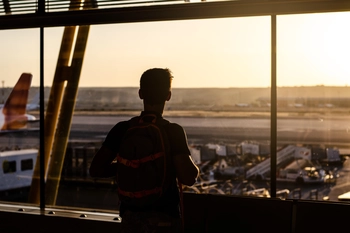There are plenty of options for a hotel in the center of Dortmund. A good one is NH Hotel Dortmund. It is located right next to the main trainstation and is in walking distance from the history city center of Dortmund. The hotel has a paid underground parking garage with enough space, so you don't have to worry about finding parking or parking your car on the street.
Europe / Germany
Dortmund: A Vibrant City with a Rich History and Culture
This page contains affiliate links. This means that I get a commission if you purchase through my links, at no cost to you.

In North Rhine-Westphalia lies Dortmund, Germany's eighth-largest city that boasts over 600k population while having rich cultural heritage across vibrant nightlife to world-famous football club Borussia Dortmund—one of Europe's finest clubs.
Dortmund has had an incredibly thrilling past dating back to the early Middle Ages when it began its journey as the Charlemagne empire’s trading post before changing course towards eventually becoming a successful commerce hub under the Industrial Revolution that contributed remarkably to the advent of beer, steel and coal manufacturing in the region.
Today, you can see echoes of Dortmund’s compelling history in its cultural spots like the Museum of Art, and Cultural History serving as an excellent archive for preserving Dortmund’s unique traits, or Kunstzentrum TU Dortmund—a contemporary art center organizing art shows throughout the year. The Reinoldikirche—a Gothic cathedral built in the 13th century is a grand reminder of how far this city has come over time.
Dortmund doesn't disappoint when it comes to entertainment where bars like stylish cocktail bars or traditional brasseries can be found flourishing on every corner.
A great way to enjoy nightlife would be downtown Alter Markt—full of exciting seats outdoors with live music shows playing during summer. View Club and Nightrooms are go-to options that offer various music genres via top DJs. Rush Hour Club's techno & house music has also garnered attention from many club-goers.
The city's love for culture continues as these events happen every year: classical concerts at popular venues such as Dortmund Concert Hall; theatrical performances around town; exhibitions emphasizing gender discussions at Dortmund U Art Center that showcases impressive contemporary art designs; outdoor summer festivals offering leisure times to locals and tourists both at Westfalengarten. Dortmund exudes beauty through its exquisite park that encompasses gorgeous gardens, tranquil lakes/fluid fountains, and outdoor spots hosting a wide array of diverse year-round cultural events such as concerts and passionate festivals targeted at different demographics/age groups. No trip to Dortmund is complete without witnessing Germany’s renowned soccer club Borussia Dortmund founded in 1909 nicknamed “Eintracht vom Dortmunder Borsigplatz” due to its equally famous fan base noted for their unwavering support towards its impressive players and amazing pitch.
Signal Iduna Park—ranked among other global giant-sized football stadiums—adds even more charm by providing visitors a chance to experience live matches, the thrill of football matches hosted at one of Germany's most iconic venues, ignite style and glamour by learning about the club’s history or even getting closer to their favorite players. When it comes to offering various activities, Dortmund provides a perfect blend of historical reminisces, cultural experiences, and thriving nightlife. With availability catering to folks from varying fields like sports enthusiasts or even leisure-seekers; Dortmund continues are magnetize more people from across different regions of Germany captivated by all that this lively city embodies.
Tips and recommendations
- Hotels in Dortmund
- Restaurants in Dortmund
There are plenty restaurants in Dortmund. But if you are looking for traditional German food, you should definitely try out HÖVELS Hausbrauerei. It is a beer brewery with a restaurant, with delicious food and beer. It is located on the outside of Thier-Gallery shopping mall.
Frequently Asked Questions about Germany
- What currency does Germany use?
Germany uses the Euro (€) as its official currency.
- Are credit cards accepted in Germany?
Yes, credit cards are widely accepted in Germany. Visa and MasterCard are commonly used, and you can find card payment options in most establishments.
- What is the best time to travel to Germany?
The best time to visit Germany is during the late spring (April to June) and early autumn (September to October) when the weather is pleasant, and many outdoor festivals and events take place. The Christmas markets during December are also popular.
- What is the population of Germany?
The population of Germany is around 83 million people.
- What language do they speak in Germany?
The official language of Germany is German. English is widely spoken and understood, especially in urban areas and among younger generations.
- Do I need a visa for Germany?
Visa requirements can vary based on your nationality and the purpose of your visit. Citizens of many countries within the European Union (EU) and the Schengen Area do not need a visa for short stays (up to 90 days) in Germany. However, it's essential to check the latest visa requirements and regulations based on your specific situation before you travel.
- Is Germany a safe country?
Germany is generally considered a safe country to visit. Crime rates are relatively low, and the country has a well-developed infrastructure. Standard travel precautions are recommended.
Budget Breakdown
Keep in mind that the prices may differ depending on various factors like the location, amenities, seasonal demand and any special events or festivals taking place when you plan to travel. It's always a good idea to do some research on current prices and read recent reviews to make sure you're getting the best deal that matches your accommodation preferences. All of these prices are for one person.
| Accommodation | Budget | Comfort | Luxury |
|---|---|---|---|
| Hostel | €10.00 - €20.00 | €20.00+ | - |
| Hotel | €50.00 - €70.00 | €70.00 - €120.00 | €150.00+ |
| Airbnb | €30.00 - €50.00 | €60.00 - €100.00 | €120.00+ |
| Restaurants & Food | Budget | Comfort | Luxury |
|---|---|---|---|
| Restaurant | €8.00 - €15.00 | €20.00 - €40.00 | €50.00+ |
| Drinks & Going Out | Budget | Comfort | Luxury |
|---|---|---|---|
| Beer | €3.00 - €5.00 | €5.00 - €8.00 | €8.00 - €12.00 |
| Wine | €4.00 - €7.00 | €7.00 - €12.00 | €12.00+ |
| Cocktail | €8.00 - €10.00 | €10.00 - €15.00 | €15.00+ |
Hotels in Dortmund
Here’s a list of the hotels where I stayed during my time in Dortmund. Each hotel is rated based on my overall experience, and I’ve also included a price range to give you an idea of what to expect in terms of cost.
| Name | Type | Price | Rating |
|---|---|---|---|
| Hotel NH Dortmund | Hotels | € € € € |
Restaurants in Dortmund
These are the restaurants I visited while exploring Dortmund. I’ve provided my overall rating for each spot, along with a price range to help you understand how much a meal might cost.
| Name | Type | Price | Rating |
|---|---|---|---|
| Hövels Hausbrauerei | Restaurants | € € € € | |
| Intermezzo Bar | Bars | € € € € | |
| Pfefferkorn Dortmund Hoher Wall | Restaurants | € € € € | |
| Pfefferkorn's No. 1 am Markt | Restaurants | € € € € | |
| Wenkers am Markt | Restaurants | € € € € |
Activities in Dortmund
This table lists the activities I enjoyed during my visit to Dortmund. I’ve included both an overall rating and a price range for each activity.
| Name | Type | Price | Rating |
|---|---|---|---|
| Dortmund U-Tower | Museums | Free | |
| Florianturm | Tourist Attractions | € € € € | |
| Phoenix-See | Lakes | Free | |
| Steinwache | Museums | Free | |
| Westfalenpark | Parks | € € € € |
Travel Resources for Dortmund
VRR
With the VRR app, you can conveniently purchase tickets for public transport within the Rhine-Ruhr region. The app offers features such as real-time updates, route planning, and ticket management, making it easy to navigate and pay for travel across buses, trains, and trams.
Visit VRR


